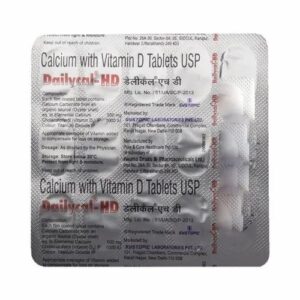CALCIUM CARBONATE + ZINC SULPHATE + LYSINE + CALCITRIOL
Calcium Carbonate: Calcium carbonate is a medication used to treat conditions caused by low calcium levels in the body. It is commonly prescribed for conditions such as osteoporosis, osteomalacia, and hypoparathyroidism.
The mechanism of action of calcium carbonate is relatively simple. It works by providing the body with supplemental calcium, which is an essential mineral for various bodily functions. Calcium plays a crucial role in maintaining healthy bones, teeth, and muscles, as well as facilitating proper nerve function.
The dose of calcium carbonate depends on the individual’s specific needs and the severity of their calcium deficiency. It is typically taken orally, with or without food. Doctors usually advise taking calcium carbonate with meals to enhance its absorption. It is important to follow the prescribed dose and consult a healthcare provider for personalized dosage instructions.
While calcium carbonate is generally considered safe, it may cause some side effects. Common side effects include constipation, gas, bloating, and stomach upset. These side effects are usually mild and temporary. However, if they persist or worsen, it is important to notify a healthcare professional.
In rare cases, high doses of calcium carbonate or prolonged use can lead to hypercalcemia, a condition characterized by high levels of calcium in the blood. Symptoms of hypercalcemia may include nausea, vomiting, increased thirst, frequent urination, confusion, and muscle weakness.
Calcium carbonate may interact with some medications, such as certain antibiotics, bisphosphonates, and corticosteroids. It is essential to inform your healthcare provider about all the medications you are currently taking to prevent any potential drug interactions.
In summary, calcium carbonate is a medication used to supplement calcium levels in the body. It supports bone health and is commonly prescribed for conditions involving low calcium levels. It is important to follow the recommended dose and be aware of potential side effects, consulting a healthcare provider if necessary.
Zinc Sulphate: Drug Name: Zinc Sulfate
Use: Zinc sulfate is a mineral supplement that is used to prevent or treat zinc deficiency. It is also prescribed to individuals with certain medical conditions, such as Wilson’s disease, chronic diarrhea, and certain types of skin conditions.
Mechanism of Action: Zinc is an essential mineral required for the proper functioning of various enzymes in the body. It plays a critical role in cell division, protein synthesis, immune function, and wound healing. Zinc sulfate provides the body with the necessary zinc levels to support these physiological processes.
Dose: The recommended dosage of zinc sulfate can vary depending on the individual’s age, health condition, and severity of zinc deficiency. It is available in different formulations, including tablets, capsules, and liquid.
For the prevention or treatment of zinc deficiency, the usual adult dose is 220-440 mg (50-100 mg elemental zinc) per day, divided into multiple doses. The dose for pediatric patients is determined based on their age and weight, typically ranging from 2.5 to 10 mg/kg per day.
It is crucial to follow the dosage instructions provided by the healthcare professional or mentioned on the product label.
Side Effects: While zinc sulfate is generally considered safe, some individuals may experience side effects. Common side effects include gastrointestinal symptoms such as nausea, vomiting, diarrhea, and stomach cramps. These side effects are usually mild and transient.
In rare cases, high doses of zinc sulfate or long-term use may lead to copper deficiency, which can manifest as anemia, neurological symptoms, and reduced immune function. Overdosing may also cause fever, cough, sore throat, fatigue, and other flu-like symptoms. Allergic reactions to zinc sulfate are rare but possible.
It is important to consult a healthcare professional before starting zinc sulfate supplementation to determine the appropriate dosage and identify any potential risks or interactions with other medications or health conditions.
Lysine: Lysine is an essential amino acid that is necessary for the growth and maintenance of tissues in the body. It is available as a dietary supplement and is commonly used for the prevention and treatment of cold sores caused by the herpes simplex virus.
The exact mechanism of action of lysine in treating cold sores is not completely understood. It is believed that lysine works by inhibiting viral replication and preventing the virus from multiplying and spreading. Lysine also helps in the production of collagen, a protein that is important for the health and integrity of the skin and connective tissues.
The usual recommended dose of lysine for the prevention or treatment of cold sores is 1000-3000 mg per day, split into multiple doses. It is important to follow the dosage instructions provided by a healthcare professional or as indicated on the product label.
Lysine is generally considered safe when taken in normal doses. However, high doses of lysine (greater than 10 grams per day) may cause gastrointestinal symptoms such as diarrhea, abdominal pain, and nausea. Rarely, allergic reactions to lysine supplements have been reported, including skin rashes and itching.
It is worth noting that lysine supplementation may interact with certain medications or medical conditions. Individuals with kidney or liver disease, as well as those taking medications that affect kidney function, should exercise caution when using lysine supplements and consult with a healthcare professional.
Overall, lysine is a commonly used dietary supplement for the prevention and treatment of cold sores. However, it is important to use it under the guidance of a healthcare professional and to be aware of potential side effects and interactions.
Calcitriol: Calcitriol is a synthetic form of vitamin D3, also known as cholecalciferol. It is a hormone that regulates the absorption of calcium and phosphorus in the body. Calcitriol is primarily used in the treatment of various conditions related to calcium metabolism disorders such as hypoparathyroidism, osteoporosis, and renal osteodystrophy.
The main mechanism of action of calcitriol is to increase the absorption of calcium from the gastrointestinal tract and promote its reabsorption from the kidneys. It stimulates the synthesis of calcium-binding proteins in the intestinal epithelium, facilitating the transport of calcium across the cell membrane. Furthermore, it enhances calcium absorption from the bones and regulates calcium and phosphate levels in the blood.
Calcitriol is available in different formulations, including capsules and oral solutions. The dose of calcitriol varies depending on the condition being treated and the patient’s individual response. It is essential to follow the prescribed dosage instructions carefully and not exceed the recommended dose.
Like any medication, calcitriol may cause some side effects. Common side effects may include headache, dizziness, nausea, vomiting, constipation, loss of appetite, dry mouth, increased thirst, and increased urination. It is important to inform a healthcare provider if any severe side effects occur, such as muscle weakness, irregular heartbeat, signs of an allergic reaction, or signs of high vitamin D levels (such as confusion, excessive thirst or urination, or unusual tiredness).
Calcitriol may interact with other medications, so it is crucial to inform the healthcare provider about any other drugs being taken. Additionally, individuals with certain medical conditions, such as high calcium levels or kidney disease, should exercise caution while using calcitriol.
It is always advisable to consult a healthcare professional regarding the appropriate use, dosage, and potential side effects of calcitriol for an individual’s specific condition.


